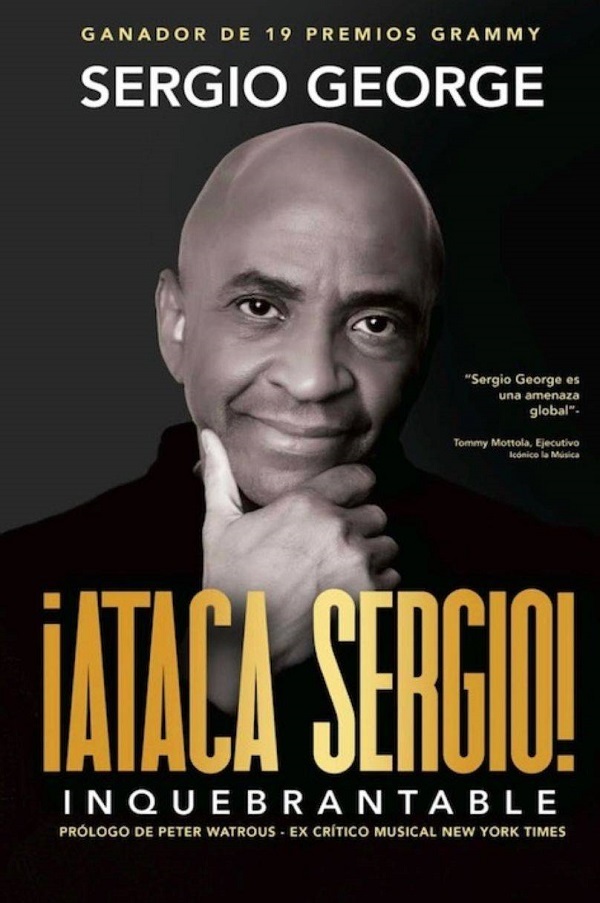I placed the order online on October 25, 2023. By return email, I received confirmation of payment and a promise to receive my copy the following week.
However, after several days I received a delay notification from the supplier. It was understandable that an artist of Sergio George’s stature would trigger interest in acquiring the work that promised to tell his story, perspective and opinion on the music industry. Exactly on November 25, 2023, the order arrived.

As a reader, I was deeply disappointed with the content of the “book”. Attack Sergio! Unbreakable falls short of being an autobiography. I would classify it as a self-help book with little depth, no substance.
Writing a book requires literary knowledge, basing the content on rigorous research and stating the data with mathematical precision.
The cover of the text is appropriate for the trajectory of the artist who is the subject of the text. However, the data on the cover that assures that he is the winner of 19 Grammy awards contradicts the text. Specifically, on the third page of the introduction it says that he is the winner of 18 or 19. Evidently, the recently launched book should not be taken as a reference for a subject of such seriousness.
From the legal page it is clear that Sergio George is the author and that Janice Rodriguez was in charge of editing. Sadly, the work lacked editorial care, which detracts from the literary value of what is presented. There are many expressions that seem to be literal translations from English and that do not necessarily maintain the idiomatic integrity of what the author wants to express. Now, if that were the case, you should stop counting the missing and extra accents.
Having said that, I am going to manage my criticism, since space is limited and the idea is not to write another book about the “book”. Certainly, in the world of the versed salsero, of which I am one, the most awarded producer in Latin music has a great story to tell. But his literary delivery fell short. I understand the intention to approach his complaint as a self-help book. But that grand intention also failed.
I read in each of the 128 pages discontent, loathing, complaint, frustration, resentment and wounded self-esteem. Objectively, you have to read carefully to see that what he claims to do is the opposite of what has brought him so much controversy.
In his usual combative style Sergio George launches harsh criticisms of salsa artists. Resentment has won out over objectivity. Each blow takes away the value of his exposition, until it becomes the outlet that we all need to have at given moments.

Of course, emotional maturity is what prevents one from publishing matters that should remain in the privacy of conversations between the affected parties.
With a high sense of arrogance, characteristic of narcissistic personalities, the author accuses the “great salseros” of having murdered salsa because of their ego, pointing them out as the culprits of the death of the “musical genre”.
This becomes another of the great contradictions of the text. At times he claims that salsa is not a genre, but on multiple occasions he refers to salsa as a musical genre. On the other hand, he says that salsa is in danger of extinction shortly before assuring that it is dead. His point of view in that sense is not clear either, although he does state near the end that there is a legacy that does not die.
This is the contradictory nature of the reading, whose common thread is the attack. That may be the origin of the idea of the title, although at first glance one might think that “Attack Sergio!” is the repetition of the battle cry that invites him to attack the piano, while he prolifically produces music.

I believe in the evolution of the species and I see that the adaptations through which salsa has gone through are similar to the genetic modifications necessary so that, within each species, the fittest survive.
The text has several anecdotes. However, due to the lack of details, these do not add value to the construction of the history of salsa. In some of them, the names of certain characters are not mentioned. I guess the author did not want to enter into a request for relays or preferred not to risk dealing with legal controversies.
With so much that Sergio George has contributed to the history of Latin music, it is a mistake that the book has not been given more structure and objectivity.
Sergio George has been a cornerstone in the history of Afro-Latin rhythms and is the owner of a brilliant musical career that has made many shine. But to that exposure, the text does not do justice either.
Also Read: Metamorphosis: from music to photojournalism, a reinvention without limits
